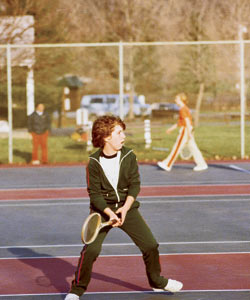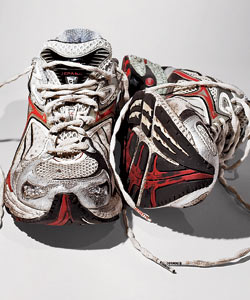Jogging is one of the stupidest things a person can do.
It’s boring.
It hurts.
It’s lonely.
No one keeps score.
It takes so little talent a two-year-old can do it.
So why do I run?
Not long ago, The New York Times printed a story in its science section about the motivations of joggers. Some people jog because they want to experience and overcome pain, the article said, while others seek a state of euphoria. Really? Were those really the only choices: pain versus euphoria? That’s like asking if people fly for the cramped seating or the great view of clouds. The obvious answer is neither.
No sane person likes sore muscles, blisters, shin splints, or tendonitis. And while I’ve heard friends say exercise really does induce feelings of euphoria, I have my doubts. Have you ever seen a runner who looked remotely happy?
To me, running is about as enjoyable as carrying groceries upstairs to your apartment. There’s pleasure in putting them down, but that’s it.
And yet I run. A lot. I’ve been running for 15 years now. To make matters worse, for the past five years I’ve been running outdoors year-round, every other day, no excuses, in all kinds of weather. In those five years, I’ve logged more than 5,000 miles. If I hadn’t turned around, by now I’d be in Paraguay.
It’s become a habit. I don’t think about it anymore. My body expects it, and I no longer feel like I need to push myself to get out the door, even on the coldest days. I’m not a great runner. I’m not fast. I’m not graceful. I just keep going.
But why?
I had a chance to think about it back in the spring when I ran a half marathon on the lakefront. Forty-mile-an-hour winds whipped down from the north, turning my jacket into a rippling sail. Icy rain poked my face like pencil points. At mile 7, I couldn’t feel my fingers. At mile 8, I couldn’t feel my hands.
Still, I never thought about quitting—mostly because the walk back to my car would have been even slower and more painful, even less euphoric, than the run.
Then, somewhere around mile 9, for no particular reason, I began reviewing the story of my life in sports, from kindergarten relay races to softball in Grant Park. It wasn’t much of a story, mind you. It reminded me of one of those long, meaningless foreign films with no drama, no hero, no villain, and no apparent ending. But it helped pass the time, and as I watched it go by, I figured out why I run.

When I was a boy, my body counted for everything. The things that mattered most were the things my body could or couldn’t do: run fast, throw hard, jump high, dodge quickly. I was small and slow. With no chance to be the great slugger, the forceful rebounder, or the hard-charging running back, I settled for style points. I tried to be the crafty batter poking base hits through the infield holes, the point guard dishing the most elegant passes, the wide receiver running the tightest routes.
And when that failed, on account of merely adequate hand-eye coordination, I settled for defense. In baseball, I could field my position well. In basketball and football, I was determined enough to stick like flypaper to my opponents.
But no matter how hard I tried and how much I practiced, my body would never do quite what I wanted it to. It would take me only so far.
Puberty came late for me, so by the time I was 16, I stood only about five feet two and weighed 120 pounds, while other kids my age had grown to six feet and more. I was too old for Little League and much too small for high-school baseball, football, or basketball. I still played my share of pickup basketball and touch football games, but it looked like my days of organized sports were coming to an end, much too soon for my taste.
Fortunately, I found refuge on my high school’s tennis team. Tennis was a game in which height and strength, while helpful, were not required. Most important, I found a coach named Tom Mounkhall, a big, strong, quiet guy, probably about 25, who looked like Clark Kent in gray sweatpants. He was a former college basketball player who took the tennis team job because it was the only coaching position available. He knew nothing about racket sports, but he maintained the philosophy that if you grind away at anything long enough and hard enough, you can get results.
There were rumors that he’d been a Catholic monk. He had a simmering, silent intensity that made his players believe the rumors. I can’t remember him teaching us much about tennis. He almost never picked up a racket to demonstrate technique. And though we won county championships nearly every year, I can’t remember a single point of a single match. My memories are all about conditioning and discipline.
Coach used to park his car beside the court and would honk his horn when you tossed the ball in the air to serve or as you prepared to smash an overhead. If you were focused on the ball, he said, it shouldn’t bother you.
If he heard you curse during a match, he would forfeit your next point. If he heard you curse a second time, he’d forfeit the game. A third cost you the match.
Coach Mounkhall had a lot of rules like that, but there are two that I remember most clearly. First, the heels of your shoes should never touch the court during a point. Second, when a ball goes over your head, even if you’re sure it’s headed out-of-bounds, you don’t stop running until you see it hit the ground. If Coach Mounkhall noticed one of his players standing flat-footed or saw a player stop running before the ball hit the ground, he would stop the match and demand ten pushups. It didn’t matter if you were exhausted or if you were playing a tiebreaker to determine the set; rules were rules.
These were the late 1970s and early 1980s. We wore our hair long and smoked pot. No one talked about rules. Except Coach Mounkhall.
I had never met anyone like him.
During my final season on the team, I began to grow, at last. In the summer of 1981, I shot up six or seven inches, and thanks to daily suicide sprints, pushups assigned for various misdemeanors, and endless laps around the football field, I felt big and strong for the first time in my life, although still not as big and strong as I would have liked.
I never became a star on the team. But one year I did win Coach Mounkhall’s Hardest Worker Award, which was the only award he ever presented. That was the proudest day of my high-school career.
I had barely cracked the starting lineup on the varsity when I quit the team to take a job writing for the local newspaper. I knew that I would never be more than a better-than-average tennis player. I didn’t have the natural talent. I wasn’t a natural as a writer, either. The words didn’t come to me the way they did to some others, like colorful scarfs pulled endlessly from a magician’s sleeve. I had to pound away at my sentences, pounding and pounding until they went from lousy to less lousy to maybe not so bad to possibly pretty good and then, occasionally, to something I felt good having my name attached to.
Over time, I’ve become more efficient as a writer, but it still feels like pounding to me. It still feels like running.
So there I was that day this spring, slogging my way north along the lakefront, blinking cold rain out of my eyes and thinking about my body, which I could no longer feel.
For many years, I blamed my body for my sporting failures. Once I had wanted to be bigger. But running actually made me even more compact. And now, as I ran, I realized that my feelings had completely changed.
Running, it turns out, plays to my strengths. It offers direct reward for hard work. It makes a wiry little guy a bit more wiry. It makes a plodder plod a bit more lightly.
After all these years, my body and I have made peace. The challenge now is to see how long I can keep chugging.
Eventually, there will be injuries. There will be illness. Someday I won’t be able to run at all.
In the end, the body always lets us down.
The trick, I think, is to not stop running until the ball hits the ground.




